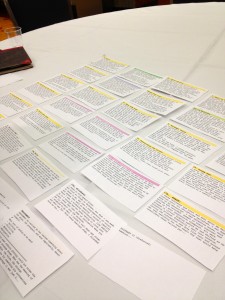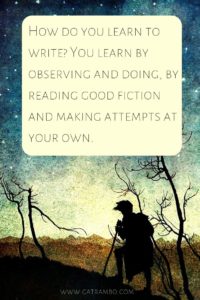 I’ve been teaching an advanced workshop that’s been a lot of fun. I gave them one of my favorite texts, an issue of Swamp Thing by Alan Moore called “Pog.” You might want to read it before proceeding on to the discussion of it. Go ahead, I’ll wait.
I’ve been teaching an advanced workshop that’s been a lot of fun. I gave them one of my favorite texts, an issue of Swamp Thing by Alan Moore called “Pog.” You might want to read it before proceeding on to the discussion of it. Go ahead, I’ll wait.
I picked that text because it has a high degree of emotional impact. It was a great starting point for talking about how to create that in a piece of fiction. In discussing how Moore achieved that, we realized that it is primarily constructed through the characters. While it’s nice to see the images, they are not the primary source of the impact.
Here are the five ways that impact is created:
- The characters are in a problematic situation with which we, the reader, can identify. While we have never rocketed through space in a ship shaped like a turtle shell, we do know the feeling of exile. We know what it is like to lose a home, and despair of finding a new one.
- The characters are acting to solve their problem, even in the face of growing despair. Accordingly, we root for them and their valiant effort.
- We see the characters caring for each other, taking care of each other in a way that is loving and endearing.
- The characters are freaking adorable. Seriously cute. How can we not love them? I’m reminded of the Aeslin mice Seanan McGuire uses in her urban fantasy series or the fuzzies in H. Beam Piper’s Little Fuzzy series (free on the Kindle!) (also rebooted by John Scalzi). They speak in a way that is absolutely charming and full of wordplay.
- And one can’t underestimate the glow of nostalgia that this comic holds for those who loved the original Pogo strip by Walt Kelly.
So what takeaways for character building can one draw from this? Are there axioms that can be applied in one’s own writing? Of course there are, and here’s the list:
- Give your characters a real problem. More than one. The shittier you are to your characters, the more people can identify with them.
- Make characters act. They don’t need to make the right decision, but they do need to make one, and experience its results. Characters that are simply floating through the story being buffeted by forces outside their control are a stretch to identify with.
- Give us something to love about the character, even when they’re unsympathetic.
- Don’t be afraid to be a little sentimental. I know the more cynical among you will flinch at that advice, and I’m not fond of very sappy stuff, but in my experience, the stories that lean hard towards the sentimental often do much better than those that do not.
- As to whether or not one should rely on paying tribute to other loved texts as an overall narrative strategy, that’s up to you. But one of the important things about such a strategy is that you must allow for the reader who does not know the original text. What you produce must be entertaining to them even without that overlay.
What strategies have I overlooked? Characters are pretty central to stories, and strong, clearly delineated characters will serve you well.
Enjoy this writing advice and want more content like it? Check out the classes Cat gives via the Rambo Academy for Wayward Writers, which offers both on-demand and live online writing classes for fantasy and science fiction writers from Cat and other authors, including Ann Leckie, Seanan McGuire, Fran Wilde and other talents! All classes include three free slots.
Prefer to opt for weekly interaction, advice, opportunities to ask questions, and access to the Chez Rambo Discord community and critique group? Check out Cat’s Patreon. Or sample her writing here.






 How do you learn to write? You learn by observing and doing, by reading good fiction and making attempts at your own. The truth is that writing is primarily self-taught, that the axiom that you must write a million words is on the mark, and that the first rule is this: To learn to write, you must be writing.
How do you learn to write? You learn by observing and doing, by reading good fiction and making attempts at your own. The truth is that writing is primarily self-taught, that the axiom that you must write a million words is on the mark, and that the first rule is this: To learn to write, you must be writing.


2 Responses
How about ‘don’t give characters names that are so hard to say in one’s head the reader skips anything related to them’ 😉
I have a hard time with: Give us something to love about the character, even when they’re unsympathetic. I need to learn this.
For some reason I like small details about characters, such as Picard: Earl Grey, hot, and tugging at his uniform top, and how he likes archeology and plays that flute.